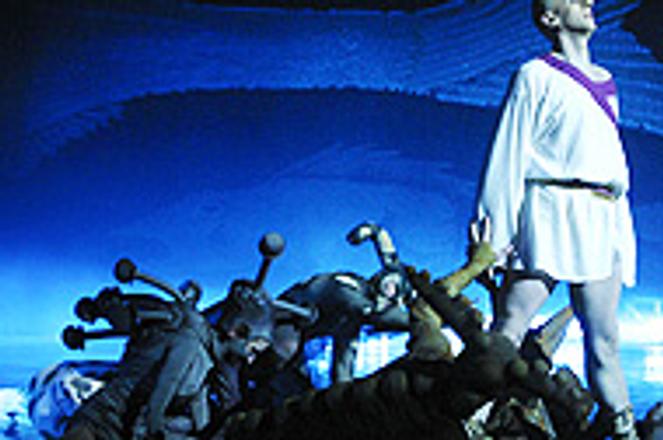CALIGULA, the cruel ruler obsessed with being divine, enters the Slovak theatre scene.photo: Ctibor Bachratý
THE BEST Slovak ballet dancer and the most significant talent of 2003 will receive The Philip Morris Ballet Flower Award at the Slovak National Theatre (SND) on January 30. Traditionally, the annual ceremony is connected with the premiere of a new ballet. This year the SND Ballet presents Caligula, which follows last year's Rasputin as another original Slovak work entering the institution's repertoire.
"It's rare for an original work to appear on stage," said Nikita Slovák, one of the creators of Caligula's theme and libretto. The SND Ballet is enjoying such an opportunity thanks to its director, Emil T. Bartko, who has been working on creating a space for local composers since he came to the theatre in 1989.
Caligula, though, is not exceptional only for being an original work. It also pioneers a fusion between ballet and drama.
INGRID Timková as Juno.photo: Ctibor Bachratý
The story of the cruel and insane Roman emperor, who was obsessed with wanting to be a god and thus rejected all laws, be they human or divine, is divided between ballet dancers and theatre actors. The dancers portray people that are forced to worship the sick behaviour of their ruler, which gradually affects the deities, played by theatre actors.
"I try to portray Caligula the best I can, and since I have no predecessor [in this role] I have to search for the right means of expression myself," said ballet dancer Roman Novitzky, a nominee for this year's Philip Morris Ballet Flower Award for the greatest talent. He is alternating the part with last year's winner, Juraj Vasilenko, an experienced dancer of "negative" character roles (ballets Ras-putin, Carmina Burana).
The dancers and actors alike welcome the synthesis in the performance that diverts it from "classical ballet".
"It's interesting, refreshing. We are in a new environment; there is that movement... We've also realised what a drill this performance is since we have to control ourselves to speak exactly to the music," said Ingrid Timková, who performs the "divine" role of Juno.
Her stage partner Marián Geišberg, or the god Jupiter, added: "There are very few opportunities in which one can play a god for money - well, except for politicians who do it for the taxpayers' money. And I love to play gods."
MARIÁN Geišberg as Jupiter.photo: Ctibor Bachratý
Premieres of the Caligula ballet take place at 19:00 on January 30 and 31 at the Slovenské národné divadlo (Slovak National Theatre), on Hviezdoslavovo Square. Tickets can be bought and reserved at the SND's Central Box Office at the corner of Jesenského Street and Komenského Square, Mondays to Fridays from 8:00 to 17:30, and on Saturdays from 9:00 to 13:00. For more information call 02/5443-3764.
According to the ballet's creators, Nikita Slovák and Igor Holováč, it is a story of zealotry. "Caligula, following no laws, spreads evil among the people on Earth. The gods watch them from above, then begin to understand them and stop being gods," said Slovák.
His co-partner on the work, Holováč, added: "There are a few quite brutal scenes. I don't recommend the ballet for children under 15."
Holováč said that the historical character of Caligula and the negativity surrounding him has long been a source of inspiration. "He's a very interesting person, and his way of ruling - the things he did and why - offer a great theme for [a ballet work]," he explained, adding that the timing of the premiere has nothing to do with the situation on the current Slovak political scene, even though, "one might find some resemblances there."


